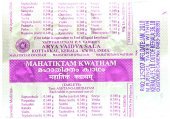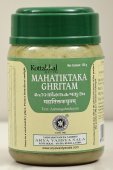Kane, Kaṇe: 7 definitions
Introduction:
Kane means something in Hinduism, Sanskrit, biology. If you want to know the exact meaning, history, etymology or English translation of this term then check out the descriptions on this page. Add your comment or reference to a book if you want to contribute to this summary article.
Biology (plants and animals)
Source: Wisdom Library: Local Names of Plants and DrugsKane [काने] in the Nepali language is the name of a plant identified with Commelina benghalensis L. from the Commelinaceae (Dayflower) family having the following synonyms: Commelina canescens, Commelina cucullata, Commelina hirsuta. For the possible medicinal usage of kane, you can check this page for potential sources and references, although be aware that any some or none of the side-effects may not be mentioned here, wether they be harmful or beneficial to health.
Kane [काने] in the Nepali language is the name of a plant identified with Floscopa scandens Lour. from the Commelinaceae (Dayflower) family having the following synonyms: Tradescantia paniculata, Commelina hispida, Aneilema hispida.
Kane [काने] in the Nepali language is the name of a plant identified with Cyanotis cristata (L.) D.Don from the Commelinaceae (dayflower) family.
Source: Google Books: CRC World Dictionary (Regional names)1) Kane in India is the name of a plant defined with Morina coulteriana in various botanical sources. This page contains potential references in Ayurveda, modern medicine, and other folk traditions or local practices.
2) Kane in Indonesia is also identified with Erythrina fusca It has the synonym Corallodendron glaucum (Willd.) Kuntze (etc.).
Example references for further research on medicinal uses or toxicity (see latin names for full list):
· Lloydia (1974)
· Brittonia (1939)
· Illustrations of the Botany … of the Himalayan Mountains (1833)
· Prodromus Systematis Naturalis Regni Vegetabilis (1825)
· Hortus Bengalensis (1814)
· Journal of the Arnold Arboretum (1972)
If you are looking for specific details regarding Kane, for example extract dosage, side effects, diet and recipes, chemical composition, pregnancy safety, health benefits, have a look at these references.

This sections includes definitions from the five kingdoms of living things: Animals, Plants, Fungi, Protists and Monera. It will include both the official binomial nomenclature (scientific names usually in Latin) as well as regional spellings and variants.
Languages of India and abroad
Sanskrit dictionary
Source: DDSA: The practical Sanskrit-English dictionaryKaṇe (कणे).—ind. A particle expressing the satisfaction of a desire (śraddhāpratīghāta); कणेहत्य पयः पिबति (kaṇehatya payaḥ pibati) Sk. P.I.4.66. 'he drinks milk to his heart's content or till he is satisfied.'
Source: Cologne Digital Sanskrit Dictionaries: Monier-Williams Sanskrit-English DictionaryKaṇe (कणे):—ind., considered as a gati in the sense of ‘satisfying a desire’ [Pāṇini 1-4, 66], (e.g. kaṇe-hatya payaḥ pibati, he drinks milk till he is satiated, [Kāśikā-vṛtti])
[Sanskrit to German]
Sanskrit, also spelled संस्कृतम् (saṃskṛtam), is an ancient language of India commonly seen as the grandmother of the Indo-European language family (even English!). Closely allied with Prakrit and Pali, Sanskrit is more exhaustive in both grammar and terms and has the most extensive collection of literature in the world, greatly surpassing its sister-languages Greek and Latin.
Kannada-English dictionary
Source: Alar: Kannada-English corpusKaṇe (ಕಣೆ):—
1) [noun] a twig, slender branch; a stick.
2) [noun] a slender pointed missile shot from a bow, usu. feathered and barbed; an arrow.
3) [noun] a long, stiff, sharp spine of a porcupine that can be erected.
--- OR ---
Kaṇe (ಕಣೆ):—
1) [noun] a long bamboo staff.
2) [noun] a stick with zigzag surfaced head at one end, used to stir, beat or shake curd in a churn to make butter; a churn-stick.
3) [noun] a slender shaft with a pointed tip and other end being feathered used to be shot from a bow; an arrow.
4) [noun] an old unit for measuring the area of a land.
5) [noun] a stick of standard length used for this purpose.
6) [noun] the heavy wood or stone which by revolving in a mortar grinds oil-seeds to extract oil, in a bullock-driven oil mill.
7) [noun] a long pole with a broad blade at one end used for propelling or steering a boat; an oar.
8) [noun] the slender, jointed stem of plants as sugarcane, jowar, etc.
9) [noun] the long beam of the plough.
10) [noun] any of the farm implements, as plough, etc.; an agricultural implement.
--- OR ---
Kaṇe (ಕಣೆ):—[noun] a knot tied to hold the sari at the waist.
--- OR ---
Kaṇe (ಕಣೆ):—[noun] a distinguishing voice of a singer or sound of a musical instrument.
--- OR ---
Kaṇe (ಕಣೆ):—
1) [noun] '[a wrong form of ಕಡೆ [kade]3] the last stage; the final point of time (of one''s life, existence, etc.); the time of death, destruction, etc.; conclusion; finish.'2) [noun] the last part of anything; the boundary or the district along the boundary; border; edge; margin.
--- OR ---
Kaṇe (ಕಣೆ):—[independent] an indiclinable denoting 'you know!' (while addressing girls or women younger to oneself).
--- OR ---
Kaṇe (ಕಣೆ):—[noun] the climber Piper longum of Piperaceae family.
--- OR ---
Kaṇe (ಕಣೆ):—[noun] any undesired, uncultivated plant, esp. one growing in profusion so as to crowd out a desired crop, disfigure a lawn, etc.; a weed.
--- OR ---
Kane (ಕನೆ):—[noun] a young cow that has not yet calved.
--- OR ---
Kāṇe (ಕಾಣೆ):—[noun] the fact or an instance of disappearing; disappearance; a going out of sight.
--- OR ---
Kāṇe (ಕಾಣೆ):—[noun] a kind of fish.
--- OR ---
Kāṇe (ಕಾಣೆ):—[noun] = ಕಾಣಿ [kani]1.
--- OR ---
Kāne (ಕಾನೆ):—
1) [noun] a house; a place.
2) [noun] a sliding box in a table, bureau, chest, etc., that can be drawn out and then pushed back into place; a drawer.
3) [noun] a small rectangualur mould for moulding bricks.
Kannada is a Dravidian language (as opposed to the Indo-European language family) mainly spoken in the southwestern region of India.
See also (Relevant definitions)
Starts with (+48): Kaane, Kane unyu, Kane-jhar, Kane-parsi, Kanear, Kanecan, Kaneci Bahuli, Kanecumarikkanakku, Kanedaguru, Kanedara, Kanedodu, Kanedudu, Kaneelblom, Kaneeltjie, Kanegaltale, Kanegare, Kanegedaru, Kaneghado, Kanegile, Kanegol.
Ends with (+145): Adubhutakane, Akkakkane, Alakkane, Alkane, Amdakane, Amgatakane, Amgatalakane, Amkane, Aykane, Babarakane, Babarkane, Baccakane, Badabadakane, Baghakane, Bakhra kane, Bakhra-kane, Bakkane, Banakane, Basakkane, Baykane.
Full-text (+10): Kane unyu, Rukh kane, Hatki kane, Ske-tshe, Xu mi jie, Bakhra kane, Hatho-kane, Kaane, Kane-jhar, Araya, Sim-kane, Bakhra-kane, Masino-kane, Rukh-kane, Sharayantra, Rameshvara-bhatta, Danadharmaprakriya, Karikkalan, Indranila, Dashaparadhika.
Relevant text
Search found 44 books and stories containing Kane, Kaṇe, Kāṇe, Kāne; (plurals include: Kanes, Kaṇes, Kāṇes, Kānes). You can also click to the full overview containing English textual excerpts. Below are direct links for the most relevant articles:
Sahitya-kaumudi by Baladeva Vidyabhushana (by Gaurapada Dāsa)
Text 10.221 [Bhrāntimān] < [Chapter 10 - Ornaments of Meaning]
Text 10.198 [Samādhi] < [Chapter 10 - Ornaments of Meaning]
Text 10.188 [Uttara] < [Chapter 10 - Ornaments of Meaning]
Rig Veda (translation and commentary) (by H. H. Wilson)
Rig Veda 10.155.1 < [Sukta 155]
Chaitanya Bhagavata (by Bhumipati Dāsa)
Verse 2.28.95 < [Chapter 28 - The Lord’s Pastime of Accepting Sannyāsa]
Verse 1.16.168 < [Chapter 16 - The Glories of Śrī Haridāsa Ṭhākura]
Verse 2.20.116-118 < [Chapter 20 - The Glories of Murāri Gupta]
Yajnavalkya-smriti (Vyavaharadhyaya)—Critical study (by Kalita Nabanita)
Chapter 1.1e - The Major Smṛtis < [Chapter 1 - Introduction]
Chapter 1.2e - The Commentaries on the Yājñavalkyasmṛti < [Chapter 1 - Introduction]
Chapter 1.2d - The Yājñavalkyasmṛti and its relation with other Ancient Literature < [Chapter 1 - Introduction]
The Matsya Purana (critical study) (by Kushal Kalita)
Part 2 - Matsyapurāṇa: an introductory note < [Chapter 1 - Introduction]
Part 3 - Date of the Matsyapurāṇa < [Chapter 1 - Introduction]
Part 4.2a - Akṣayatṛtīyā-vrata < [Chapter 4 - Religious aspects of the Matsyapurāṇa]
Kuntaka’s evaluation of Sanskrit literature (by Nikitha. M)
1. Date of Kuntaka < [Chapter 1 - Vakroktijīvita: A Synoptic Survey]
3.1. Purpose of poetry according to Kuntaka < [Chapter 1 - Vakroktijīvita: A Synoptic Survey]
Review of literature < [Introduction]
Related products


